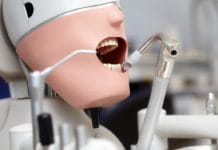Earning the title RDH is no easy task, and you can ask any graduate, surviving the 2-3 years of dental hygiene school is a rite of passage. Yet, on this journey, some want more after a few years of clinical practice and have taken the path to higher education to complete a bachelors or master’s degree. I have worn many hats in my own journey and have enjoyed every step of the way.
My path began as a part-time clinical instructor where I decided to complete my BS online. Almost eight years later, after teaching full-time, I decided the time was right to begin my master’s track. For those of you asking, how do you decide what degree path? For me, it was easy; I loved teaching and education. I loved being able to share my knowledge and experience with others and help them grow. It was just this past December I completed grad school and felt the burn of being a student and a teacher at the same time!
Since 1998 when I graduated with my AAS in dental hygiene, the face of education has evolved. Today’s students, educators, and institutions are faced with many challenges, and it begins in K-12. What we know is that students in K-12 are being educated differently and are under the demands of standardized testing and common core curriculum design. If you are like most RDH’s, including me, I cringe when I see the 6th-grade common core math homework come out! Today’s students differ greatly than those of past generations.
Inspirational speaker, Simon Sinek, describes the millennial generation as unprepared, socially inept, and entitled. He also explains that these traits are no fault of their own; they are a product of this technological era and although some may find it controversial, different parenting skills. Today’s college students are products of no child left behind, and everyone gets a trophy. So, if you ponder education as a way out of the op, and enter education just to teach, you will quickly be disappointed!
This trickle-down effect has higher education facing additional challenges such as declining rates of retention and completion in dental hygiene programs. Unprepared high school graduates are now offered college success courses to help fill the gaps in K-12 education. We also see other non-traditional trends in education, such as flexible path programs credit for experience. Recently, I participated in a summit to help review prior experience for veterans in the dental field so that they may earn college credit. The other trend is online education; it is becoming popular due it’s flexibility and the cost of education. Online educational programs or degree completion programs allow students to earn an income while attending school. I completed both my undergrad and graduate studies online through Northern Arizona University and had a wonderful experience as an online student.
How does this effect dental hygiene programs?
As dental hygiene educators, particularly in a community college setting, we see a diverse population of students, some enter nearly out of high school, and others return to school for a second career choice. Students enter dental hygiene school and quickly realize the demands of college-level writing, research, communication, and critical thinking that are needed. And then we add some stress! Oh, the stress of dental hygiene school! If you are like me, you remember it well, and it was like a rite of passage to be able to graduate and finally end your name with RDH!
I think the heart of these complex factors in education doesn’t mean that programs are good or bad, or affect the quality of education, but as educators, we must be open to recognize the barriers and embrace the change and challenges surrounding educational methodology. This raises the bar for our students. As dental educators, we set the standard for excellence; passing dental hygiene boards depends on it! CODA states there are over 185,000 licensed RDH’s and over 335 entry level DH programs. This requires a vast number of dental educators.
Even though education today is embracing change, the great news is that it is allowing more opportunity and options for students. As a community college instructor, time is of the essence, and it’s difficult to add more with less time. However, if the entry-level degree was a bachelor’s program, community colleges could act as a transfer program to a completion program. As advanced practice spreads across the country with more responsibility, I believe you will see a trend towards this degree process.
Why do I love being an educator?
The challenge for me is to not only teach the material but inspire the students to strive for excellence and to provide quality care for patients. I want my students to yearn to be lifelong learners. I want my experience to guide them and teach them how to be successful not only as a hygienist but as an oral health expert, valuable team player, and to love the profession as much as I do!
So, despite the challenges and the hard work, if you are still thinking of transitioning out of clinical practice to becoming an educator, here is what you need to know:
Commission on Dental Accreditation outlines the faculty support of dental programs. With the dental therapy programs on the rise, I believe, we will see a push for more graduate level and doctoral level degrees to support the educational aspects of a two year’s master’s track for dental therapists. However, on the mainstream, most colleges will require a degree above what you are teaching. For instance, if you are teaching at a community college, your required degree may be a bachelor’s degree for didactic/full-time positions. Although it is not unusual for educators to have a master’s degree in dental hygiene, health education, or education. Educators at a university will seek an applicant with a master’s degree or higher for didactics & administration. If you are entering a program to teach in the clinic, the great news is your institution may accept your associate’s degree and experience as acceptable.
Initially, I recommend seeking out an institution that will hire you on a part-time, clinical basis and allow you to explore education and see if it is for you, before investing time and money into pursuing a degree you may not want or need. My other piece of advice is to first speak with a program director at your school to determine what final degree they prefer or what they will look for in full-time faculty hires. I’d love to tell you it is the same everywhere, but it is not. The great thing about this is that if you should choose to return to gain a higher degree, this can mean a lot of versatility in your course of study. Personally, I wanted variety and wanted to branch out into education, instead of an MSDH. This choice could limit me if I chose to inquire into a university program, but I did my research and knew where I wanted to end up. It was a great choice for me, and in the end, I am very happy with my Master’s in Educational Leadership.
If you are considering becoming an educator, I say YES, DO IT, and take the leap of faith! Do some prep work, some shadowing, and ask a lot of questions! In the end, know that our profession needs educators. Quality educators with excellent clinical backgrounds will only enhance future generations and our new upcoming hygienists!
Before you leave, check out the Today’s RDH self-study CE courses. All courses are peer-reviewed and non-sponsored to focus solely on high-quality education. Click here now.
Listen to the Today’s RDH Dental Hygiene Podcast Below:
SEE ALSO: Dental Drama: Is a Lifetime Movie Playing Out in Your Office?
DON’T MISS: Expand Your Career by Thinking Like an Entrepreneur
REFERENCES
- ADHA, 2016. https://www.adha.org/resources-docs/75112_Hygiene_Based_Workforce_Models.pdf
- ADHA, 2016. Transforming dental hygiene education and the profession for the 21st century . Retrieved from http://tenndha.com/wp-content/uploads/2015/10/ADHA-White-Paper.pdf
- CODA, 2016. Accreditation Standards for Dental Therapy Education Programs http://www.ada.org/~/media/CODA/Files/dt.pdf
- Crossman, D. 2016. Simon Sinek: On millennials in the workplace. Retrieved from https://www.youtube.com/watch?v=hER0Qp6QJNU
- Stewart, R 2016. Colleges, Universities Making Retention, Completion Priority. Retrieved from http://diverseeducation.com/article/87929/












